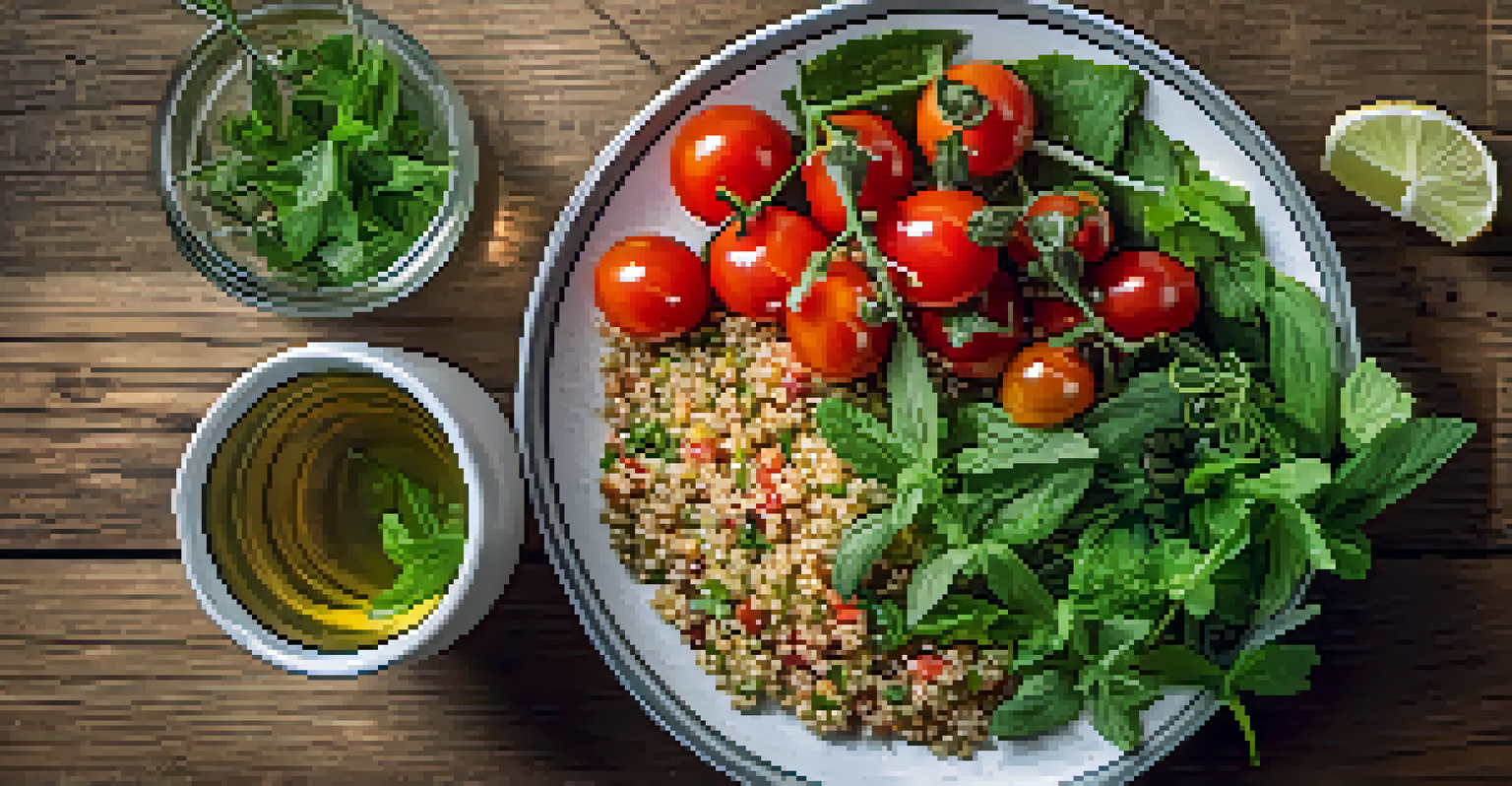Nutritional Science: The Benefits of Plant-Based Diets

Understanding Plant-Based Diets: A Simple Overview
Plant-based diets primarily focus on foods derived from plants, including fruits, vegetables, nuts, seeds, and whole grains. Unlike strict vegetarianism or veganism, these diets can include small amounts of animal products. This flexibility makes it easier for many people to adopt a plant-based lifestyle.
Let food be thy medicine and medicine be thy food.
The core idea is to emphasize whole, unprocessed foods while reducing the intake of meat and dairy. This approach has gained popularity not only for its health benefits but also for its positive impact on the environment. Essentially, it’s about making more mindful food choices.
It's essential to note that a plant-based diet isn't just about eliminating certain foods; it's about incorporating a variety of nutrient-rich options. This diversity helps ensure that individuals receive all the necessary vitamins and minerals for optimal health.
Health Benefits: Why Go Plant-Based?
One of the most significant advantages of a plant-based diet is its potential to improve heart health. Research shows that diets rich in fruits, vegetables, and whole grains can reduce the risk of heart disease by lowering cholesterol and blood pressure levels. This is largely due to the high fiber content found in plant foods.

Additionally, plant-based diets are associated with lower risks of chronic diseases such as type 2 diabetes and certain cancers. The antioxidants and phytochemicals present in these foods help combat inflammation and oxidative stress, which are contributors to these conditions. Think of it as giving your body a natural defense system.
Health Benefits of Plant-Based Eating
A plant-based diet can improve heart health, reduce chronic disease risks, and assist in weight management.
Moreover, many people find that adopting a plant-based diet helps with weight management. Plant foods tend to be lower in calories yet high in nutrients, making it easier to maintain a healthy weight without feeling deprived. You can enjoy a variety of delicious meals while still pursuing your health goals.
Nutritional Considerations: Key Nutrients to Focus On
While a plant-based diet offers numerous benefits, it's crucial to pay attention to specific nutrients that might be lacking. Key nutrients to consider include protein, iron, vitamin B12, calcium, and omega-3 fatty acids. Each of these plays a vital role in maintaining overall health.
The greatest threat to our planet is the belief that someone else will save it.
For instance, while plant-based protein sources like beans, lentils, and quinoa are abundant, it's essential to consume a variety to ensure you're getting all the essential amino acids. Similarly, iron is found in plant foods, but it’s in a form that’s less easily absorbed by the body. Pairing iron-rich foods with vitamin C can enhance absorption.
Vitamin B12, primarily found in animal products, is another nutrient of concern for those following a strict plant-based diet. It’s advisable to consider fortified foods or supplements to meet your B12 needs. Overall, with a little planning, a plant-based diet can provide all the nutrients necessary for a healthy lifestyle.
Environmental Impact: Eating for the Planet
Choosing a plant-based diet isn't just beneficial for individual health; it also has a significant positive impact on the environment. Animal agriculture is a leading contributor to greenhouse gas emissions, deforestation, and water usage. By reducing meat consumption, you can help lower your carbon footprint.
Furthermore, plant-based diets require less land and water compared to traditional meat-based diets. For example, producing a pound of beef can use upwards of 1,800 gallons of water, while a pound of lentils uses only about 50 gallons. This stark contrast highlights the resource efficiency of plant-based eating.
Environmental Advantages of Plant-Based
Eating plant-based significantly lowers your carbon footprint and conserves water and land resources.
By opting for more plant-based meals, you're not only making a healthier choice for yourself but also contributing to a more sustainable food system. It's a win-win situation: better health for you and a healthier planet for future generations.
Adapting to a Plant-Based Lifestyle: Tips for Success
Transitioning to a plant-based diet can feel overwhelming at first, but it doesn't have to be. Start by gradually incorporating more plant-based meals into your routine. Perhaps try 'Meatless Mondays' or swap out a few meals each week with plant-based alternatives. Small changes can lead to significant results over time.
Experimenting with new recipes and cooking techniques can also make the transition easier and more enjoyable. There are countless resources available, from cookbooks to online blogs, dedicated to plant-based cooking. Find meals that excite your taste buds and make you look forward to dining.
Finally, join a community or find support from friends and family. Sharing your journey and experiences can provide motivation and inspiration. Plus, it’s always more fun to explore new food choices together!
Common Myths About Plant-Based Diets Debunked
Despite the growing popularity of plant-based diets, several myths still persist. One common misconception is that you can't get enough protein without eating meat. In reality, there are numerous plant-based sources of protein, such as beans, tofu, and nuts, that can meet your daily needs.
Another myth is that plant-based diets are costly. While some specialty products can be pricey, focusing on whole foods like grains, beans, and seasonal vegetables can be quite economical. In fact, many staple plant-based ingredients are affordable and can stretch over multiple meals.
Overcoming Plant-Based Diet Myths
Common misconceptions about protein intake, cost, and flavor in plant-based diets are easily debunked with knowledge.
Lastly, there's a belief that plant-based diets are bland or boring. This couldn't be further from the truth! The variety of flavors, textures, and cuisines available in plant-based cooking can make every meal exciting. With a little creativity, you can enjoy delicious and satisfying meals that excite your palate.
Getting Started: Resources for Plant-Based Eating
If you're intrigued by the idea of adopting a plant-based diet, numerous resources can help you get started. Websites, apps, and cookbooks dedicated to plant-based cooking are abundant and can provide a wealth of information. They often include meal plans, recipes, and tips to make the transition smoother.
You might also consider joining local or online communities focused on plant-based lifestyles. These groups can offer support, share experiences, and provide recipe ideas. Connecting with like-minded individuals can make the journey more enjoyable and motivating.

Lastly, don't hesitate to consult a nutritionist or dietitian who specializes in plant-based diets. They can help tailor your diet to your specific needs, ensuring you're meeting all your nutritional requirements. With the right guidance and resources, embracing a plant-based diet can be a fulfilling and rewarding experience.